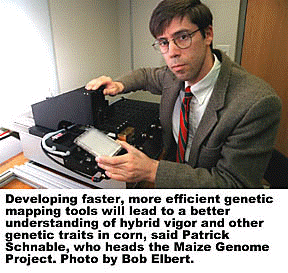Inside Iowa State
March 31, 2000
Planting the seeds of collaboration
Schnable is a professor of agronomy. And a professor of zoology and genetics. He also directs two centers of the Plant Sciences Institute: the Center for Plant Genomics and the Center for Plant Transformation and Gene Expression.
 "When I was 12 or 13, my mother explained what a Punnett
Square was. That fascinated me," said Schnable, referring to
the chart that shows all possible gene combinations of two
parents.
"When I was 12 or 13, my mother explained what a Punnett
Square was. That fascinated me," said Schnable, referring to
the chart that shows all possible gene combinations of two
parents.
A few years later, the teenager turned his family's garden into awkward, albeit well-intentioned, research plots.
"I had always enjoyed plants, but I was fascinated with corn. I did some experiments with Indian corn in the backyard. I sorted seed of different colors, planted them in different corners of the garden and then asked what kinds of ears I'd get from those plants," he said. "I didn't know enough to do the experiments right. But I made a stab at it."
Schnable's fundamental curiosity about how plants work steered him to a B.S. in agronomy from Cornell University, a Ph.D. in plant breeding and cytogenetics from Iowa State and a postdoctoral fellowship at Germany's prestigious Max Planck Institute for Plant Breeding Research.
In 1988, Schnable landed back at Iowa State as an assistant professor. He's been blazing trails ever since.
Now he heads the Maize Genome Project, a $2.9 million research effort funded as part of the National Science Foundation's Plant Genome Project.
The three-year project, formally called "High-throughput Mapping Tools for Maize Genomics," started last September. It brings together a multidisciplinary research team to develop new, efficient genetic mapping tools that will identify the physical locations of genes on chromosomes. The tools will be used to molecularly dissect the corn genome at a rate of thousands of genes at a time, and help the team better understand the molecular nature of complex genetic traits, such as the vigor of hybrids, Schnable said.
Schnable has one more vision for the project. He wants to facilitate interaction between plant breeders and molecular biologists.
"These are two very different disciplines," he said. Plant breeders look at the combined action of all the genes in a large population of plants. Molecular biologists, on the other hand, look at how a particular gene controls a particular trait.
"There's a lot of excitement about the ability of the two disciplines to interact because they could make changes in plants that aren't possible via either traditional plant breeding or molecular biology alone," he said.
Genomics -- the study of all the genetic material in an organism -- allows researchers to look at thousands of genes in one experiment. "That gets us up to the scale that interests plant breeders," Schnable said.
"If we can understand which genes are involved in particular traits, the information can be useful to plant breeders," Schnable explained. "It will help them make decisions about which inbreds to test in hybrids. It also will help them understand why certain techniques have been so successful in the past and perhaps help them find more efficient ways to proceed in the future.
"The problem is, in order to do this right, we need to look at thousands of plants at the DNA level. And we need to look at thousands of genes in each plant," Schnable said. "Current technologies simply don't allow us to do that efficiently and cost-effectively. So we're developing new molecular tools for genetic mapping.
"By the third year of the project, we'll actually place these 10,000 genes on a genetic map," Schnable said. "When that's done, we'll be able to conduct lots of experiments to see which genes are controlling traits."
Iowa State faculty on the research team are Xun Gu, agronomy and zoology and genetics; Daniel Ashlock, mathematics; Michael Lee, agronomy; Kendall Lamkey, USDA/agronomy; and Gavin Naylor, zoology and genetics. Another team member is Gary Churchill of the Jackson Laboratory, a non-profit independent research institution in Bar Harbor, Maine.
"One of the really exciting things is that the basic, fundamental understanding that we'll get about corn also will translate to making a better corn plant," Schnable said.
Iowa State homepage
Inside Iowa State, inside@iastate.edu,
University Relations Revis
ed 03/30/00
Copyright © 1999, Iowa State University, all rights
reserved
URL:
http://www.inside.iastate.edu/2000/0331/schnable.html